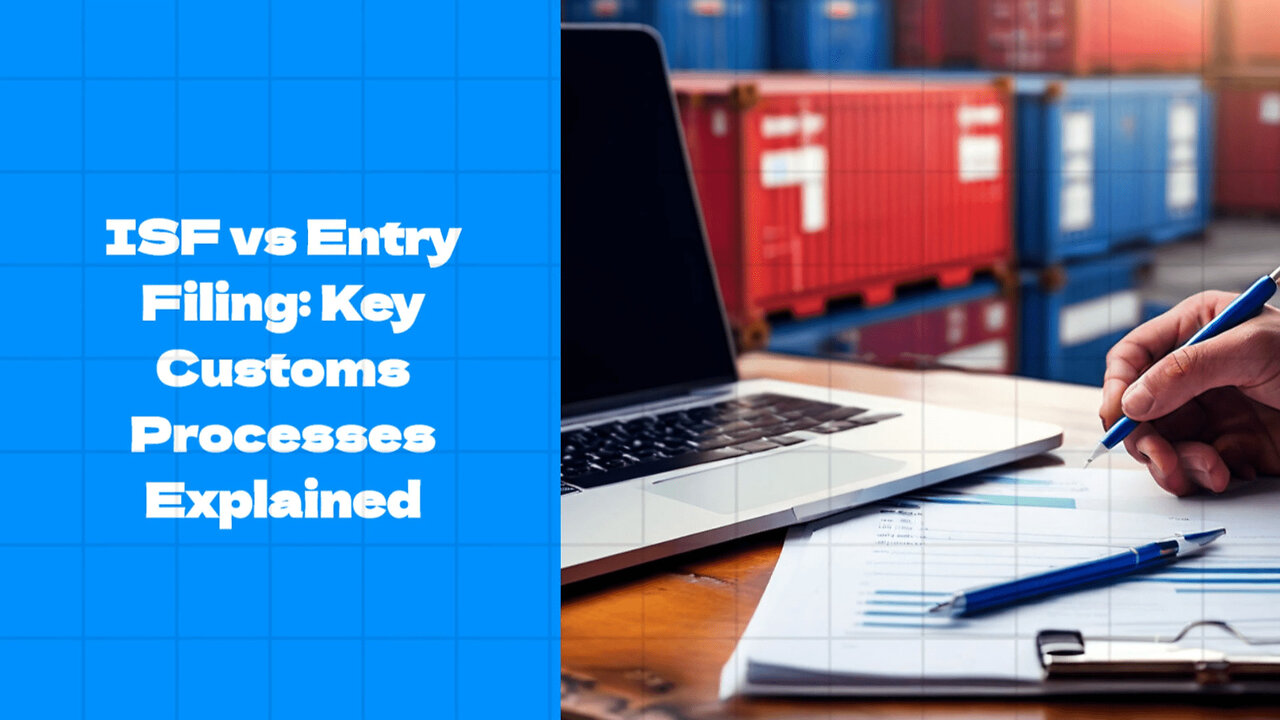Premium Only Content

Comparing ISF Filing and Entry Filing: Understanding Key Customs Processes
ISF Depot // 661-246-8217 // customs@isfdepot.com // www.isfdepot.com
ISF (Importer Security Filing) filing and entry filing are two critical customs processes that importers should be well-versed in. ISF filing is a mandatory requirement by the US Customs and Border Protection (CBP) and is completed at least 24 hours before the vessel's departure. The purpose of ISF filing is to provide advance information about the incoming cargo to assess potential risks. This filing includes ten data elements about the importer, seller, manufacturer, and ship-to party. On the other hand, entry filing, also known as customs entry or customs clearance, is the process of submitting detailed information and documentation to CBP to obtain the release of imported goods from customs custody. This filing is typically done by a customs broker on behalf of the importer and contains comprehensive information about the goods, such as classification, value, country of origin, and duties owed.
The key differences between ISF filing and entry filing lie in the timing and consequences of non-compliance. ISF filing must be completed pre-departure, whereas entry filing is typically done post-arrival within a specific timeframe. Non-compliance with ISF filing can lead to penalties, cargo holds, or even denial of entry, while non-compliance with entry filing can result in delayed cargo release, additional penalties, or seizure of goods. ISF filing and entry filing are interconnected processes, where accurate and timely ISF filing lays the foundation for smooth entry filing. Customs brokers play a crucial role in ensuring compliance with both processes, leveraging their expertise in customs regulations and procedures to navigate the complexities on behalf of importers. Understanding and successfully navigating these processes is essential for importers to comply with customs regulations and facilitate their international trade operations.
#usimportbond #isfcustomsbroker #uscustomsclearing #isfentry
Video Disclaimer Here: This tutorial is independent and not affiliated with any US governmental entities.
00:33 - ISF filing is a mandatory requirement by the U.S. Customs and Border Protection for shipments entering the United States, while entry filing is the process of submitting detailed information and documentation to obtain the release of imported goods from customs custody.
00:44 - ISF filing must be completed at least 24 hours before the vessel's departure, while entry filing is typically done after the goods have arrived at the U.S. port within a specific timeframe.
02:21 - Failure to submit ISF information on time can lead to penalties, cargo holds, or denial of entry, while non-compliance with entry filing requirements may result in delays, penalties, or even seizure of goods.
02:43 - ISF filing provides advance information about incoming cargo to assess risks, while entry filing provides comprehensive information about imported goods for customs to determine admissibility and calculate duties owed.
02:59 - Customs brokers play a crucial role in ensuring the successful completion of both ISF filing and entry filing, as they have the expertise to navigate customs regulations and procedures on behalf of importers.
-
 11:19
11:19
Tundra Tactical
19 hours ago $2.25 earnedI Saw How CMMG Makes Guns.
15.9K6 -
 15:34
15:34
Misha Petrov
14 hours agoReacting To TikTok’s Most DELUSIONAL Takes!
18.1K17 -
 1:52:24
1:52:24
Squaring The Circle, A Randall Carlson Podcast
1 day ago#032 Flournoy Holmes' Artwork Helped Define The Southern Rock Phenomenon of The Early 1970's
15.6K3 -
 19:56
19:56
inspirePlay
1 day ago $0.21 earnedWalking with Lions & Facing Africa’s Wild Side | Safari Adventure with the Grid Championship Crew!
8.97K1 -
 10:50
10:50
RTT: Guns & Gear
1 day ago $0.72 earnedBudget Friendly Carry 2011: EAA Girsan Brat 2311
10.6K3 -
 3:49:06
3:49:06
Alex Zedra
16 hours agoLIVE! New Game | Nuclear Nightmare
102K14 -
 25:08
25:08
MYLUNCHBREAK CHANNEL PAGE
1 day agoUnder The Necropolis - Pt 2
284K78 -
 1:45:59
1:45:59
Spittin' Chiclets
1 day agoCanadian Chokejob - Game Notes Live From Chicago - 12.28.2024
262K32 -
 9:18
9:18
Space Ice
1 day agoThe Guyver - Alien Bug Suits, Exploding Dragons, & Mark Hamill - Weirdest Movie Ever
167K27 -
 9:31
9:31
Silver Dragons
1 day agoSilver Has Failed - Can it Set the Record Next Year? THIS BANK SAYS YES!
4.94K2